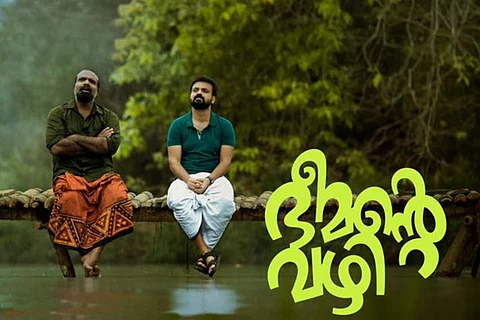

After a regular morning ride by two friends on a motorbike, squeezed through the narrow road-less paths between an array of houses, and a movie title that scrolls through the place like a brown caterpillar – it is clear what Bheemante Vazhi is going to be about. Creating a path for the people in the neighbourhood, so they won’t need to squeeze themselves or lift the elderly over fences to reach a road. It is not exactly the heroic adventure of one man speaking for many, or winning fights against the dreaded red tape. It could be a miniature of the bigger, more worrisome issue of people suffering because they can’t reach roads in times of emergencies. But Ashraf Hamza’s Bheemante Vazhi gives a lighter version of a bigger problem, treats it with humour and has a very flawed hero taking the lead.
Kunchacko Boban is introduced as a lackadaisical man who is a bit of a womanizer and talks about demanding a huge dowry when he decides to get married. He doesn’t seem to mind the squeezed bike rides or having to lift his wounded mother over fences on a rainy night to get to the hospital (Girish Gangadharan’s camera has a tough time tracing the narrow lanes and figures lurching past them). It is only after prodding from a local ward councillor, Reeta (Divya M Nair), that he gets into the picture. The problem is that all the others in the neighbourhood are more or less like Bheeman, used to traversing the congested path, not particularly desiring change.
The talks, the meetings are all endearingly presented, the way small-town gatherings are, with voices of support and opposition, no big speeches, no preaching. Chemban Vinod, the writer of the script, has also played a role in the film as a lonesome character that Bheeman confides in. It is a world away from Angamaly Diaries, the first film he scripted four years earlier. Amid the road problem, the script gives plenty of space to define each of the characters and their peculiarities. So you wouldn’t be thinking of one Bheeman and a small army of faceless people behind him.
Take a few examples. One man has a bird perched on his shoulder all the time, another man is shirtless but wears a mundu and a helmet as he walks, a third is a little boy who is always in superhero costumes. Suraj Venjaramoodu plays the adorable role of a ‘manyan’ (decent man) and Binu Pappu, a perpetual drunk. Then there is Bheeman’s neighbour, a man who is obsessed with his pet dog Jack – giving him healthy diets, asking his permission before taking him to places. It is delightful and amusing at first, but going a little further it might be insensitive and unintentionally make a mockery of animal lovers.
Without making a big deal about it, the script also throws light on the sexual aspect of humans and treats it as a natural state of affairs. The pet owner’s daughter Blessy (Vincy Aloshious) and Bheeman have an affair going on, and both are shown interested only in a fling – uncommon among non-villainous characters in Malayalam films. The woman’s unfeelingness offends the man, even though he feels the same way. Bheeman is put in his place when he asks Maharshi (Chemban) why women are lacking in emotion like this, and Maharshi reminds him that he is no different. It is remarkable that Kunchacko, an actor who once carried the reputation of always playing the nice young man, transforms into these unflattering characters so smoothly.
As in his previous film Thamaasha, director Ashraf presents a number of women characters in varied hues. Reeta is your active councillor, Blessy likes to have her fun, Sita (Jeeva) and Anju (Chinnu Chandni) are quiet but have hidden strengths. The Kannada railway engineer (Megha Thomas), who gets a lengthier role compared to all the other women, has the least peculiarities.
Ashraf has chosen a lovely cast, of mostly less popular actors, who perform remarkably well as they turn into a curious lot of residents of this village. Chemban’s characters are a contrast to the stereotype of a filmy small town. The men and women are portrayed as having no scruples about their out-of-bounds affairs. Even the antagonist, the lecherous and greedy Kosethep (Jinu Joseph) is more irritating than scary. It is (pleasantly) surprising that there is no act of moral policing, not even an interest shown towards the affairs of neighbours or even their own family members, since no place in Kerala is yet known for its broadmindedness in that area.
But despite the effort taken for such detailing of characters, the humour does not often strike the right chord and the story, while entertaining, remains a tad remote.
Disclaimer: This review was not paid for or commissioned by anyone associated with the series/film. TNM Editorial is independent of any business relationship the organisation may have with producers or any other members of its cast or crew.